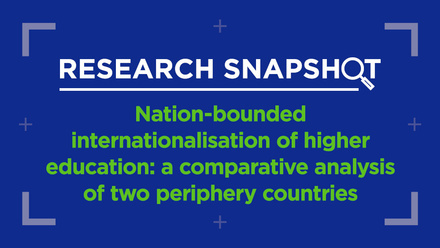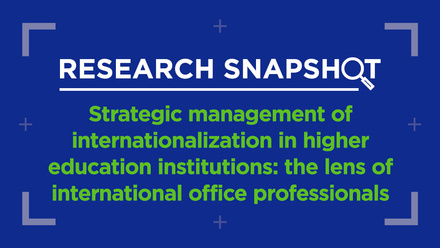Research Snapshot: The unique role of International Office Professionals

International office professionals: An example of street-level bureaucrats in higher education
Publication date: 30 August 2023
This project was conducted by a scholar/practitioner with expertise in higher education internationalisation. Recognising the unique role of IPs, it aimed to examine their work through the lens of 'street-level bureaucracy' to better understand how they implement policies. The term ‘street-level bureaucrats’ (SLBs) is mostly used in literature to define teachers or policy officers and explain their direct role in policy implementation. IPs are also an example of SLBs, as the first contact points in HEIs, they are the ones who apply the internationalisation policies. This study applied a qualitative research method, and 36 semi-structured interviews were conducted with Turkish and Polish IPs. The research questions of the study were:
- What difficulties and challenges do IPs face as the SLB of internationalisation policies?
- How do IPs use their right of discretion? What are the conditions that lead IPs to use their discretion in line with the internationalisation policy of the institution?
Ignoring the role of international office professionals (IPs) as street-level bureaucrats in HEIs risks significant challenges in implementing internationalisation policies effectively.
About the author
Key findings from the research
- The research emphasises the critical role of internationalisation professionals (IPs) as street-level bureaucrats who adapt internationalisation policies to suit institutional and student needs. IPs face numerous professional challenges, including undefined roles, communication difficulties with younger generations, and over-responsibility for supporting international students. Institutional challenges also exist, such as exclusion from policy-making processes, lack of academic support, and reliance solely on international offices for internationalisation efforts.
- The findings highlight the significant discretionary power IPs wield, balancing policy requirements with practical implementation. Positive uses of discretion include relaxing bureaucratic rules to facilitate processes, showcasing their ability to address policy gaps effectively. However, discretion can have negative consequences; overwhelmed and undervalued IPs may choose not to engage in new initiatives due to lack of support, risking reduced job satisfaction and burnout.
- Structural constraints like limited budgets and rigid policies compel IPs to employ creative problem-solving, underscoring the need for institutional reforms. Providing greater professional autonomy and addressing workload imbalances through proper analysis could enhance IPs' job satisfaction and effectiveness. Supporting IPs with clear roles, resources, and inclusion in strategic decisions is essential for fostering responsive and successful internationalisation in higher education institutions.









